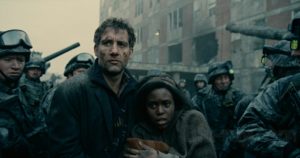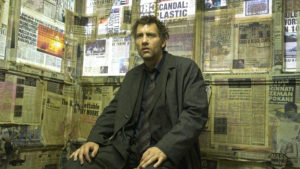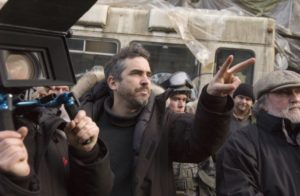 Attend: Program Notes
Attend: Program Notes
Children of Men | Alfonso Cuarón| UK, US | 2006| 109 minutes
Cinesthesia, Madison Public Library Central Branch, Thursday, December 7, 6:30pm»
In his Cinesthesia program notes, Jason Fuhrman suggests that Alfonso Cuarón’s dystopian thriller Children of Men has become even more relevant ten years after its release.
“The Muslim community demands an end to the army’s occupation of mosques,” an unseen newscaster impassively announces as Children of Men opens. “The homeland security bill is ratified. After eight years, British borders will remain closed. The deportation of illegal immigrants will continue.” She proceeds to rattle off the current headlines. “It’s Day 1,000 of the Siege of Seattle.”
Set in the year 2027, eighteen years since the last infant was born, Alfonso Cuarón’s dystopian political thriller throws us into a world devoid of hope and collapsing under the weight of universal ennui. As the human race faces eventual extinction on account of an inexplicable infertility pandemic, nations across the globe have succumbed to war, terrorism, natural disasters, climate change, nuclear accidents, and social unrest. Britain, now an authoritarian police state in permanent lockdown, remains the only country under stable governmental control and one of the only inhabitable places left on Earth. Thus refugees from all around the world flood into England, where surveillance cameras, propaganda posters and heavily armed soldiers are ubiquitous.
Based in broad outline on a dense 1992 science-fiction novel by P.D. James, Children of Men tells the story of Theo Faron (Clive Owen), an apathetic, cynical bureaucrat in the Ministry of Energy who shuffles through life in an inebriated stupor. A former political activist, Theo finds his relatively secure and comfortable existence turned upside down when his ex-wife, Julian (Julianne Moore), suddenly reappears. The leader of a radical resistance movement fighting for immigrant rights, she offers him cash to facilitate the transit of a mysterious young West African refugee named Kee (Clare-Hope Ashitey) to the British coast. Urgently in need of money and unaware of the mission’s true objective, Theo reluctantly agrees to help. Along the way, however, the plan goes horribly awry, thrusting him into a life-or-death situation. His complacency shattered, Theo begins a heroic journey that may redeem not only him, but also the entire human race.
Mexican-born director Alfonso Cuarón evokes the deteriorating London of 2027 with gritty realism and sparse futuristic flourishes. Rather than explaining humanity’s inability to reproduce or describing what has happened to civilization, the movie emphasizes the dire consequences of living in a world without children.
 Cuarón eschews expository dialogue and captions in favor of precise background details that reinforce the plausibility of this grim existence. He loads nearly every frame with important visual information—graffiti-covered walls, placards, newspaper headlines, television broadcasts, and advertisements—while always focusing on his protagonist and the human drama at the center of the narrative. He also incorporates various references to both high and low culture, ranging from Picasso to Pink Floyd. The inclusion of subversive music picks, like Radiohead’s “Life in a Glass House” and “Anti-War Dub” by Digital Mystikz, lends texture and resonance to his stark portrait of a grimy, turbulent society frayed at the edges and confronting its imminent demise.
Cuarón eschews expository dialogue and captions in favor of precise background details that reinforce the plausibility of this grim existence. He loads nearly every frame with important visual information—graffiti-covered walls, placards, newspaper headlines, television broadcasts, and advertisements—while always focusing on his protagonist and the human drama at the center of the narrative. He also incorporates various references to both high and low culture, ranging from Picasso to Pink Floyd. The inclusion of subversive music picks, like Radiohead’s “Life in a Glass House” and “Anti-War Dub” by Digital Mystikz, lends texture and resonance to his stark portrait of a grimy, turbulent society frayed at the edges and confronting its imminent demise.
“Rule one in the film is recognizability,” Cuarón explains in his behind the scenes documentary, The Possibility of Hope. “We didn’t want to do Blade Runner. Actually, we talked about being the anti-Blade Runner in the sense of how we were approaching reality. That was difficult for the art department because I would say, ‘I don’t want inventiveness. I want references to real life.’”
While the meticulous sound and production design provide the foundation for an utterly convincing dystopia, the virtuoso camerawork brings this terrible world to vivid life. Cuarón and his frequent cinematographer, Emmanuel Lubezki, sought to shoot the film almost like a documentary, with wide shots and long, continuous takes. Their innovative and unconventional techniques contribute a raw immediacy to the movie’s brilliantly choreographed action sequences, therefore resulting in a shockingly immersive cinematic experience.
Few movies exceed the sheer verisimilitude or visceral impact of the technically audacious and visually stunning battle scenes in Children of Men. Nevertheless, much of the film’s power derives from what Cuarón places in the margins of his frames. As the plot proceeds along its linear path following Theo, the camera repeatedly becomes preoccupied with what happens in the background. Though we see the world primarily through the eyes of Theo, Cuarón actively interrupts our identification with the main character to show us disturbing images outside of his awareness. These fleeting glimpses of human misery and injustice give the film a dark edge, while forcefully challenging our subjectivity as passive viewers. Children of Men plays like an exciting action thriller, but Cuarón pushes the boundaries of its genre. He elevates his film beyond mere artistic entertainment to something more intricately layered and socially conscientious.
Cuarón encountered the project in 2001, but he was initially unimpressed. After the success of his erotic social realist odyssey Y tu mamá también, the director received several screenplays to read, including an adaptation of James’s novel about global infertility. “I was not interested in a science-fiction thing about upper classes in a fascist country,” he recalls. He found the premise interesting enough to consider it with his writing partner Tim Sexton, but they concluded that it felt too much like a glorified B-movie. Then the September 11 attacks occurred and Cuarón suddenly saw a new approach into the story. Sexton says, “Our point of departure was, we’re at an inflection point. The future isn’t some place ahead of us; we’re living in the future at this moment.” Cuarón chose not to read James’s novel. He and Sexton decided to discard nearly everything but the character names, the English setting, and the basic premise of infertility.
 The film, therefore, diverges significantly from its source material. For example, the miraculously expectant mother in James’ novel is a white political dissident. Cuarón reimagines her as a black teenage prostitute with a thick African accent. In the original story, men are sterile, but in Cuarón’s adaptation, women are unable to procreate. Whereas the book explores the tormented inner landscapes of people with no faith in the future, the movie uses the premise of infertility as a springboard for examining the sociopolitical implications of living in the post-9/11 world. Cuarón recalls Lubezki declaring, “We cannot allow one single frame of this film to go without a comment on the state of things.”
The film, therefore, diverges significantly from its source material. For example, the miraculously expectant mother in James’ novel is a white political dissident. Cuarón reimagines her as a black teenage prostitute with a thick African accent. In the original story, men are sterile, but in Cuarón’s adaptation, women are unable to procreate. Whereas the book explores the tormented inner landscapes of people with no faith in the future, the movie uses the premise of infertility as a springboard for examining the sociopolitical implications of living in the post-9/11 world. Cuarón recalls Lubezki declaring, “We cannot allow one single frame of this film to go without a comment on the state of things.”
When Children of Men arrived in U.S. theaters on Christmas Day, 2006, five years after the September 11 attacks and at the height of the War on Terror, Cuarón’s bleak vision of the future already looked disturbingly familiar. But this was before the Syrian refugee crisis, before the United Kingdom voted to leave the European Union after a campaign that focused on immigrant numbers, and before a right-wing populist demagogue was elected president of the United States. While many films that predict the end times quickly age and fade from memory, Children of Men has become increasingly relevant in our present geopolitical climate. In the December 26, 2016, issue of New York magazine, Abraham Riesman writes, “The film, in hindsight, seems like a documentary about a future that, in 2016, finally arrived.”
Although it was a commercial failure in 2006, recent events have breathed new life into Children of Men. As political scientist Francis Fukuyama declared in September 2016, the film is “obviously something that should be on people’s minds after Brexit and after the rise of Donald Trump.” Indeed, Cuarón’s overlooked masterpiece has proven to be among the most prescient sci-fi films of the millennium. But in his opinion, anyone surprised at the accuracy of its predictions has not really been paying attention. “Children of Men is not a prophetic piece,” he insists. “It’s just a compound of studies and essays. . . .” In order to create a theoretical framework for the film, Cuarón read literature by anti-globalization activist Naomi Klein, cultural critic Slavoj Žižek, political philosopher John Gray, sociologist Saskia Sassen, and geographer Fabrizio Eva. He says, “People were talking about those things, just not in the mainstream!”
Like Theo, many of us can choose to ignore the background noise, keep to our main stories, and live in our own insular, hermetically sealed worlds of security, comfort, and pleasure. If Children of Men has any kind of lesson to offer in the years since its release, then Cuarón succinctly summarizes it: “What’s really relevant now is to stop being complacent.”
At once a pulse-pounding apocalyptic adventure, a complex meditation on contemporary politics, a bold, provocative look at the spiritual desolation of advanced capitalist society, a poignant reflection on the meaning of life, and a rich, textured audiovisual experience, Children of Men may be approached on multiple levels. Film critic Peter Bradshaw calls it “the thinking person’s action movie.” Less a prophecy than a revelation, Cuarón’s film conveys the fragility of modern civilization, while affirming the radical political potential of cinema. Children of Men remains vital today because the world Cuarón presents to us is a reflection of our own. In the words of Slavoj Žižek, “A good portrait is more you than you are, yourself, and I think this is what the film does with our reality … It simply makes reality more what it already is.”